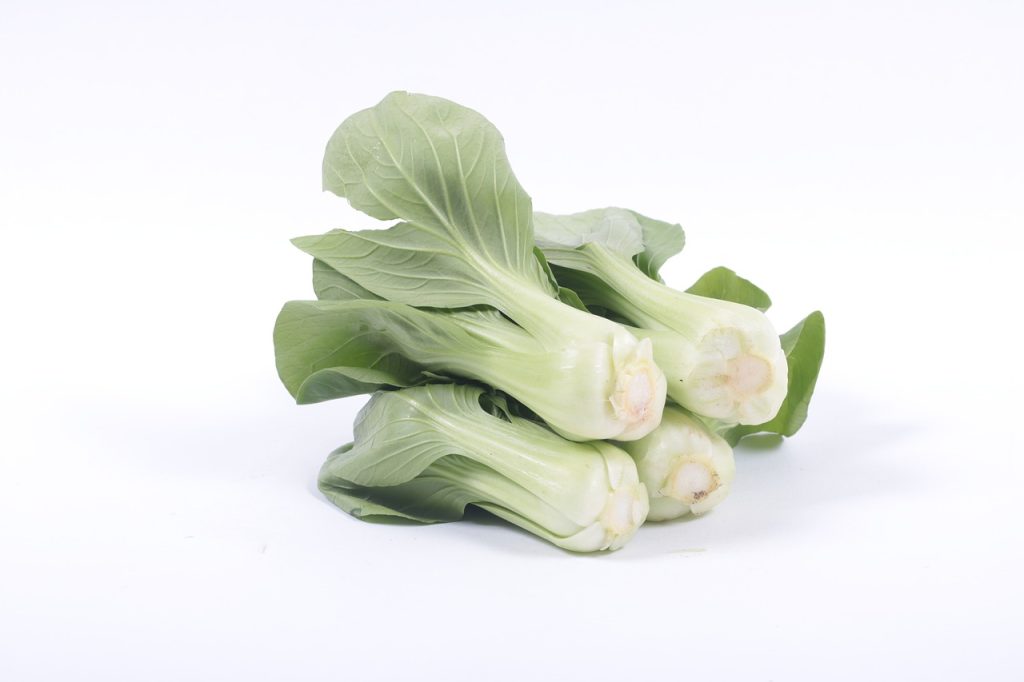Table of Contents
Bok choy, also known as Chinese cabbage, is a leafy green vegetable that has been cultivated in China for thousands of years. In recent years, it has gained popularity in Western countries due to its numerous health benefits and delicious taste. Bok choy is a versatile vegetable that can be used in a variety of dishes, and its unique texture and flavor make it a great addition to any meal. In this article, we will explore the many benefits of bok choy and why you should consider adding it to your diet.
What is Bok Choy?
Bok choy is a member of the Brassica family, which includes other popular vegetables like broccoli, cauliflower, and kale. It has a distinct appearance, with dark green leaves and white stalks that are often thick and crunchy. Bok choy is a low-calorie vegetable that is high in nutrients, making it an excellent choice for those who want to maintain a healthy diet.
Nutritional Fact of Bok Choy
One cup (70 grams) of shredded bok choy has the following nutritional profile
- Calories: 9
- Protein: 1 gram
- Total fat: 0 grams
- Total carbs: 1.5 grams
- Total sugar: 1 gram
- Fiber: 1 gram
- Calcium: 6% of the Daily Value (DV)
- Iron: 3% of the DV
- Magnesium: 3% of the DV
- Phosphorus: 2% of the DV
- Potassium: 4% of the DV
- Zinc: 1% of the DV
- Manganese: 5% of the DV
- Selenium: 1% of the DV
- Vitamin C: 35% of the DV
- Folate: 12% of the DV
- Vitamin A: 17% of the DV
- Vitamin K: 27% of the DV
Health Benefits of Bok Choy

Supports Bone Health
Bok choy is an excellent source of calcium, which is essential for maintaining strong and healthy bones. In fact, just one cup of cooked bok choy contains over 100 milligrams of calcium, which is more than 10% of the daily recommended intake for adults. Bok choy also contains other nutrients that are important for bone health, including vitamin K, magnesium, and phosphorus. Eating bok choy regularly can help to support bone health and reduce the risk of conditions like osteoporosis.
Prevents Cancer
Bok choy contains compounds called glucosinolates, which have been shown to have anti-cancer properties. These compounds work by activating enzymes in the liver that help to detoxify carcinogens and prevent them from damaging cells. Studies have found that eating cruciferous vegetables like bok choy may help to reduce the risk of certain types of cancer, including lung, breast, and prostate cancer. Adding bok choy to your diet can help to support overall health and reduce the risk of chronic diseases like cancer.
Boosts Immune System
Bok choy is high in vitamin C, an essential nutrient that helps to support a healthy immune system. Vitamin C acts as an antioxidant, helping to protect cells from damage caused by free radicals and boosting the body’s ability to fight off infections and illnesses. Eating bok choy regularly can help to provide the body with the vitamin C it needs to stay healthy and strong.
Lowers Blood Pressure
Bok choy is a good source of potassium, which plays an important role in regulating blood pressure. Potassium helps to relax blood vessels and reduce the strain on the cardiovascular system, which can help to lower blood pressure and reduce the risk of heart disease. Eating bok choy regularly as part of a balanced diet can help to support healthy blood pressure levels and promote heart health.
Aids Digestion
Bok choy is an excellent source of fiber, which is essential for healthy digestion. Fiber helps to regulate bowel movements and prevent constipation, as well as promote the growth of beneficial gut bacteria. Additionally, the high water content of bok choy can help to keep stools soft and easy to pass, reducing the risk of digestive problems. Eating bok choy regularly can help to support a healthy digestive system and improve overall gut health.
Promotes Heart Health
Bok choy is a heart-healthy food that can help to reduce the risk of cardiovascular disease. It is low in calories and fat but high in nutrients like vitamins C and K, fiber, and potassium, which are all important for heart health. Studies have shown that eating cruciferous vegetables like bok choy can help to lower levels of LDL cholesterol, also known as “bad” cholesterol, which can contribute to the development of heart disease. Additionally, the high potassium content of bok choy can help to regulate blood pressure, another key factor in maintaining heart health. Incorporating bok choy into your diet can help to support a healthy heart and reduce the risk of heart disease.
Supports Eye Health
Bok choy is rich in nutrients like beta-carotene, vitamin A, and vitamin C, all of which are important for maintaining healthy eyes and vision. Beta-carotene is converted into vitamin A in the body, which is essential for the production of rhodopsin, a pigment found in the retina that helps with night vision. Vitamin C, on the other hand, is an antioxidant that can help to protect the eyes from damage caused by free radicals. Eating bok choy regularly can help to support overall eye health and reduce the risk of age-related eye diseases like cataracts and macular degeneration.
Reduces Inflammation
Bok choy contains anti-inflammatory compounds that can help to reduce inflammation throughout the body. Inflammation is a natural response of the immune system to injury or infection, but chronic inflammation has been linked to the development of many chronic diseases, including heart disease, diabetes, and cancer. Bok choy contains a variety of anti-inflammatory compounds, including vitamins C and K, selenium, and folate. Eating bok choy regularly can help to reduce inflammation in the body, promoting overall health and reducing the risk of chronic disease.
Enhances Brain Function
Bok choy is a good source of choline, a nutrient that is essential for brain health and function. Choline is important for the production of acetylcholine, a neurotransmitter that plays a key role in memory and learning. In addition to choline, bok choy also contains other brain-boosting nutrients like folate, vitamin K, and vitamin C. These nutrients help to protect the brain from oxidative stress and inflammation, both of which can contribute to cognitive decline and the development of neurological disorders like Alzheimer’s disease. Incorporating bok choy into your diet can help to enhance brain function and promote long-term brain health.
Promotes Weight Loss
Bok choy is a low-calorie, nutrient-dense food that can be a valuable addition to any weight loss diet. One cup of cooked bok choy contains just 20 calories, making it an excellent choice for those looking to reduce their caloric intake. Additionally, bok choy is high in fiber, which can help to keep you feeling full for longer periods of time and reduce overall calorie intake. Its high water content can also help to keep you hydrated and prevent overeating. Including bok choy in your meals can help you achieve your weight loss goals in a healthy and sustainable way.
Bok Choy Useful in Pregnancy

Rich in Folate
Bok choy is an excellent source of folate, a B vitamin that is essential for proper fetal development. Folate helps prevent birth defects in the baby’s brain and spine, making it a crucial nutrient during pregnancy. One cup of bok choy provides approximately 17% of the daily recommended intake of folate.
High in Iron
Iron is another essential nutrient during pregnancy, as it helps carry oxygen to the developing baby. Bok choy is a good source of iron, providing approximately 6% of the daily recommended intake per cup.
Low in Calories, High in Fiber
Bok choy is low in calories and high in fiber, making it an ideal food for pregnant women who need to maintain a healthy weight and regulate their digestion. Fiber can also help prevent constipation, a common issue during pregnancy.
Contains Vitamin C
Bok choy is rich in vitamin C, an antioxidant that can help boost the immune system and improve iron absorption. Vitamin C also plays a crucial role in collagen synthesis, which is essential for healthy skin, bones, and tissues in both the mother and the baby.
Versatile and Easy to Prepare
Bok choy is a versatile vegetable that can be easily incorporated into a variety of dishes, from stir-fries to salads. It has a mild flavor and a crunchy texture that can add both nutrition and flavor to any meal.
How to Incorporate Bok Choy into Your Diet?

Stir-Fry
Bok choy is a great addition to stir-fries. Simply chop it up and sauté it with other vegetables and your protein of choice.
Salad
Add some crunch to your salad by using bok choy leaves as a base instead of lettuce. Top with your favorite salad toppings and dressing.
Soup
Bok choy is a great addition to soups and stews. Add it to chicken noodle soup or miso soup for a nutrient-packed meal.
Smoothies
You can add bok choy to your smoothies for a nutrient boost. Try blending it with spinach, kale, and other leafy greens for a delicious and healthy drink.
Grilled
Grilled bok choy makes for a tasty and healthy side dish. Simply brush with olive oil and grill until tender.
Slaw
Use bok choy leaves to make a healthy and refreshing slaw. Toss with a vinaigrette dressing and your favorite slaw toppings.
Tacos
Use bok choy leaves as a healthy alternative to traditional taco shells. Fill with your favorite taco fillings and enjoy.
Baked
You can also bake bok choy in the oven. Simply season with salt and pepper and bake until crispy.
Sautéed
Bok choy is also delicious when sautéed with garlic and ginger. Serve as a side dish with your favorite protein.
Wraps
Use bok choy leaves as a healthy and low-carb alternative to traditional sandwich wraps. Fill with your favorite sandwich fillings and enjoy.
Possible Side Effects of Bok Choy
Goiter
Bok choy contains goitrogens, which are naturally occurring substances that can interfere with the thyroid gland’s ability to produce hormones. This can lead to an enlargement of the thyroid gland, a condition known as goiter. However, the risk of goiter is generally low for people who consume bok choy in moderation and have a healthy thyroid function.
Gas and bloating
Bok choy is a cruciferous vegetable, which means it contains complex sugars that can be difficult for some people to digest. This can lead to gas and bloating, especially for people who are not used to consuming fiber-rich foods.
Allergic reactions
Some people may have an allergic reaction to bok choy, especially if they have a history of allergies to other vegetables in the Brassica family, such as broccoli or cabbage. Symptoms of an allergic reaction can include itching, swelling, and difficulty breathing.
Interference with blood-thinning medications
Bok choy contains vitamin K, which can interfere with blood-thinning medications such as warfarin. People who take these medications should consult with their healthcare provider before consuming bok choy or other vitamin K-rich foods.
FAQs
Q: Is bok choy high in oxalates?
A: Yes, bok choy is high in oxalates, which can contribute to the formation of kidney stones in some people. However, consuming bok choy in moderation as part of a balanced diet is generally safe for most people.
Q: Can bok choy help with inflammation?
A: Yes, bok choy contains anti-inflammatory compounds such as vitamin C, beta-carotene, and quercetin that can help reduce inflammation in the body.
Q: Is bok choy a good source of protein?
A: While bok choy is not a significant source of protein, it does contain small amounts of this macronutrient. However, it is an excellent source of many vitamins, minerals, and other beneficial compounds.
Conclusion
Bok choy is a superfood that can offer numerous nutritional benefits for your overall health. From its high nutrient content to its disease-fighting properties, bok choy deserves a place in your diet. Incorporating bok choy into your meals can help improve digestion, promote weight loss, and reduce the risk of chronic diseases. So why not give this leafy green vegetable a try and reap the many benefits it has to offer?















